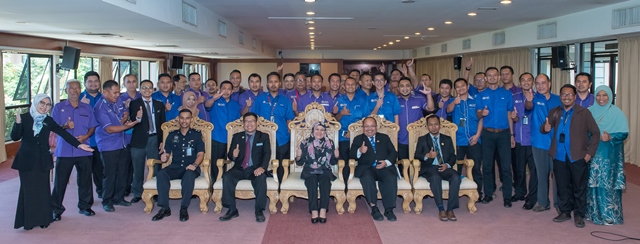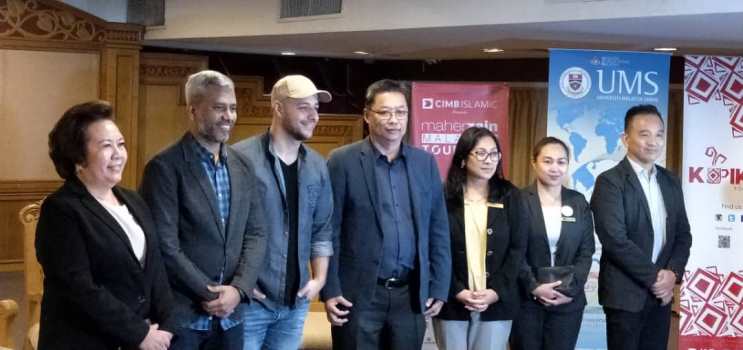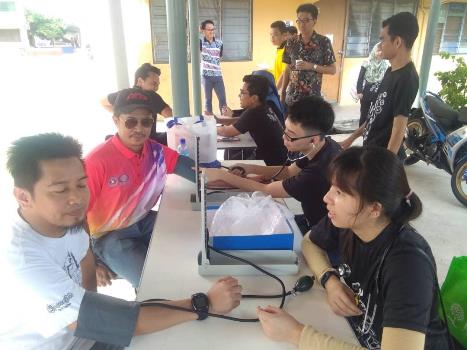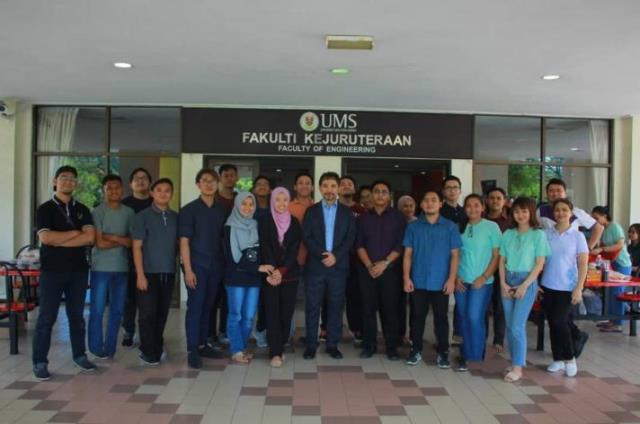 KHAMIS, 7 MAC – Pendaftar Universiti Malaysia Sabah (UMS), Vina Zahriani Yusof menggariskan empat kunci utama sebagai satu usaha agar setiap warga kakitangan UMS mampu melaksanakan peningkatan terhadap kualiti dan sistem penyampaian perkhidmatan di universiti.
KHAMIS, 7 MAC – Pendaftar Universiti Malaysia Sabah (UMS), Vina Zahriani Yusof menggariskan empat kunci utama sebagai satu usaha agar setiap warga kakitangan UMS mampu melaksanakan peningkatan terhadap kualiti dan sistem penyampaian perkhidmatan di universiti.
Empat kata kunci tersebut ialah Penambahbaikan Khidmat Pelanggan, Persekitaran Kerja yang Baik, Menggalakkan Gaya Hidup Sihat, dan Kampus Selamat dan Sejahtera.
Menurut beliau, selain penambahbaikan dalam penyampaian perkhidmatan, pengurusan universiti turut meletakkan hasrat agar setiap kakitangan menanamkan sifat integriti dalam melaksanakan tugas, serta kakitangan turut mengamalkan gaya hidup sihat dan mempunyai minda yang positif dan gembira.
“Kualiti kerja bukan sahaja dituntut seperti yang termaktub dalam pekeliling-pekeliling kerajaan, tetapi juga ada disebut dalam hadis yang menyatakan bahawa sesungguhnya Allah menyukai seseorang jika apabila kamu melakukan sesuatu tugasan, maka kamu akan melakukannya dengan ‘itqan’.
“Maksud ‘itqan’ ialah menyusun atau mengatur sesuatu perkara dengan cara terbaik untuk mencapai hasil yang baik sekali gus mampu menghasilkan kerja yang berkualiti, dan ini dituntut kepada semua lapisan kakitangan dari pengurusan teratas sehingga kepada kakitangan operasi,” katanya.
Vina berkata demikian ketika menyampaikan ucapan sempena Majlis Bual Mesra Pembantu Operasi Bersama Pendaftar UMS yang berlangsung di Galeri Majlis, baru-baru ini.
Beliau turut mengingatkan agar setiap kakitangan melaksanakan tanggungjawab seharian dengan penuh integriti.
“Integriti ialah apabila kita melakukan tugas dengan penuh amanah, bertanggungjawab, telus, ikhlas, dedikasi dan jujur, dan kesemua aspek ini memainkan peranan dalam menentukan kualiti perkhidmatan kita.
“Kurangnya elemen integriti dalam tugasan boleh menyebabkan kita mendapat aduan daripada orang awam, sekali gus boleh menjejaskan nama universiti,” katanya.
Vina memaklumkan bahawa pengurusan universiti juga mahu agar UMS mempunyai persekitaran kerja yang sejahtera dan sihat kerana aspek ini turut mampu mempengaruhi kualiti perkhidmatan.
“Untuk itu, kita telah memperkenalkan aktiviti Jom Sihat yang dilaksanakan setiap petang hari Rabu, selain turut menggalakkan kakitangan untuk melakukan pemeriksaan bagi mengurangkan tekanan diri dan mengawal pemakanan sebagai langkah mengurangkan penyakit-penyakit kronik terutama kepada kakitangan berumur 40 tahun ke atas.
“Apabila adanya kakitangan sihat, setiap kerja dapat dilaksanakan dengan lebih cekap, cepat dan tersusun, selain kurangnya aduan pelanggan, kadar cuti sakit serta kos perubatan,” katanya.
Mengulas lanjut mengenai perkara itu beliau memberitahu, peranan setiap kakitangan sama ada pengurusan atau operasi adalah sama penting, justeru setiap kakitangan perlu menghargai setiap tugas-tugas yang dipertanggungjawabkan.
Hadir sama pada majlis tersebut Ketua Bahagian Sumber Manusia, Mohd Raffie Janau; Ketua Bahagian Pentadbiran dan Governan, Mohd Zaidie Adilai; dan Pegawai Keselamatan, Rakam Singh Karam Singh yang mewakili Ketua Bahagian Keselamatan.
 SELASA, 12 MAC - Universiti Malaysia Sabah akan menjadi lokasi akhir penganjuran Konsert Jelajah Malaysia Maher Zain 2019 pada 17 Mac ini.
SELASA, 12 MAC - Universiti Malaysia Sabah akan menjadi lokasi akhir penganjuran Konsert Jelajah Malaysia Maher Zain 2019 pada 17 Mac ini.


 ISNIN, 11 MAC - Persatuan Pelajar Perubatan (Medstas) Fakulti Perubatan dan Sains Kesihatan (FPSK) Universiti Malaysia Sabah (UMS) menyertai Program Road Tour Skuad 7 Perhentian anjuran Skuad Agensi Antidadah Kebangsaan (AADK) Kota Kinabalu di Rumah Pangsa Tanjung Aru, kelmarin.
ISNIN, 11 MAC - Persatuan Pelajar Perubatan (Medstas) Fakulti Perubatan dan Sains Kesihatan (FPSK) Universiti Malaysia Sabah (UMS) menyertai Program Road Tour Skuad 7 Perhentian anjuran Skuad Agensi Antidadah Kebangsaan (AADK) Kota Kinabalu di Rumah Pangsa Tanjung Aru, kelmarin. KHAMIS, 7 MAC – Pendaftar Universiti Malaysia Sabah (UMS), Vina Zahriani Yusof menggariskan empat kunci utama sebagai satu usaha agar setiap warga kakitangan UMS mampu melaksanakan peningkatan terhadap kualiti dan sistem penyampaian perkhidmatan di universiti.
KHAMIS, 7 MAC – Pendaftar Universiti Malaysia Sabah (UMS), Vina Zahriani Yusof menggariskan empat kunci utama sebagai satu usaha agar setiap warga kakitangan UMS mampu melaksanakan peningkatan terhadap kualiti dan sistem penyampaian perkhidmatan di universiti. KHAMIS, 7 MAC - Tamu Fakulti Kejuruteraan (FKJ) anjuran Persatuan Mahasiswa FKJ Universiti Malaysia Sabah (UMS) mampu mengasah bakat siswa-siswi khususnya daripada bidang kejuruteraan untuk melibatkan diri dalam bidang keusahawanan.
KHAMIS, 7 MAC - Tamu Fakulti Kejuruteraan (FKJ) anjuran Persatuan Mahasiswa FKJ Universiti Malaysia Sabah (UMS) mampu mengasah bakat siswa-siswi khususnya daripada bidang kejuruteraan untuk melibatkan diri dalam bidang keusahawanan. RABU, 06 MAC - Sukan KKTM 2019 dianjurkan Exco Sukan dan Rekreasi Jawatankuasa Kebajikan Mahasiswa (Jakmas) Kolej Kediaman Tun Mustapha (KKTM) Universiti Malaysia Sabah (UMS) di Kompleks Sukan UMS baru-baru ini.
RABU, 06 MAC - Sukan KKTM 2019 dianjurkan Exco Sukan dan Rekreasi Jawatankuasa Kebajikan Mahasiswa (Jakmas) Kolej Kediaman Tun Mustapha (KKTM) Universiti Malaysia Sabah (UMS) di Kompleks Sukan UMS baru-baru ini.